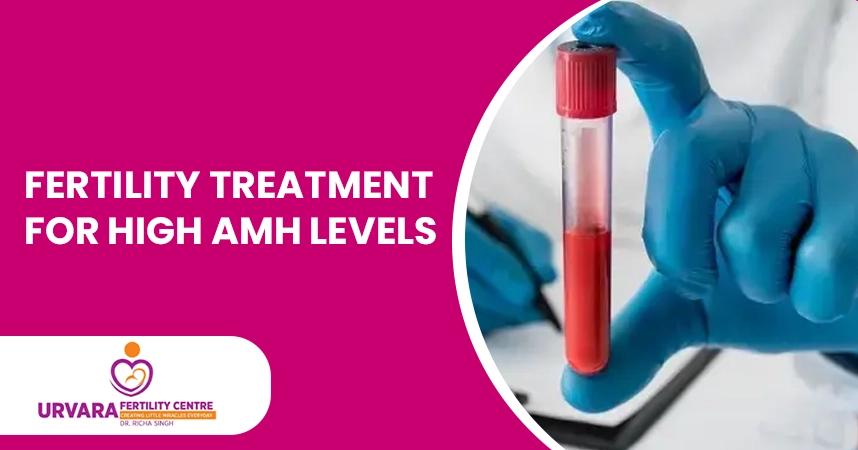
Fertility Treatment for High AMH Levels
When it comes to fertility, hormone levels play a crucial role in determining reproductive health. Among the various markers of fertility, Anti-Müllerian Hormone (AMH) levels are particularly significant. High AMH levels can indicate a different set of fertility challenges compared to low AMH levels. In this comprehensive guide, we will explore what high AMH levels mean, how they impact fertility, and the treatment options available to manage them effectively.
What is AMH?
Anti-Müllerian Hormone (AMH) is a hormone produced by the ovarian follicles, which are the sacs that contain eggs. AMH levels reflect the quantity of these follicles and are thus a useful marker of ovarian reserve—the number of eggs a woman has at her disposal.
High AMH Levels: An Overview
High AMH levels are often associated with conditions that affect ovarian function. Elevated AMH levels are commonly seen in conditions such as Polycystic Ovary Syndrome (PCOS) and can sometimes indicate issues related to ovarian hyperstimulation.
Understanding the Causes of High AMH Levels
- Polycystic Ovary Syndrome (PCOS): This is one of the most common causes of elevated AMH levels. PCOS is characterized by the presence of multiple cysts in the ovaries, irregular menstrual cycles, and high levels of androgens (male hormones). Women with PCOS often have high AMH levels due to the increased number of ovarian follicles.
- Ovarian Hyperstimulation Syndrome (OHSS): This condition can occur during fertility treatments where the ovaries are overstimulated, leading to high AMH levels.
- Genetic Factors: Some genetic conditions can lead to increased AMH production.
Impact of High AMH Levels on Fertility
High AMH levels themselves do not directly impact fertility but can be an indicator of underlying conditions that do. Here’s how high AMH levels might influence fertility:
Impact of PCOS on Fertility
Women with PCOS often have elevated AMH levels and may experience difficulty conceiving due to irregular ovulation or anovulation (lack of ovulation). Other symptoms such as weight gain, acne, and excessive hair growth can also affect overall reproductive health.
Ovarian Hyperstimulation
In the case of OHSS, high AMH levels are a response to excessive stimulation of the ovaries. While OHSS itself may not directly affect long-term fertility, it can lead to complications that need to be managed carefully.
Diagnosis of High AMH Levels
To diagnose high AMH levels, a healthcare provider will typically order a blood test to measure the AMH concentration. High levels are generally defined as being above the normal range, which varies depending on the lab and the individual’s age.
Additional Diagnostic Tests
- Ultrasound: An ovarian ultrasound may be performed to assess the number of follicles and any potential cysts.
- Hormone Panel: A comprehensive hormone panel may be conducted to evaluate other hormone levels that could be influencing fertility.
- Genetic Testing: In some cases, genetic testing may be recommended to rule out genetic conditions that could affect AMH levels.
Fertility Treatments for High AMH Levels
The treatment approach for high AMH levels depends on the underlying cause and individual fertility goals. Here are some strategies:
Managing PCOS-Related High AMH Levels
- Lifestyle Modifications: Weight management through diet and exercise can help regulate menstrual cycles and improve ovulation in women with PCOS.
- Medications: Medications such as Metformin may be prescribed to manage insulin resistance and help with ovulation. Clomiphene citrate or letrozole may also be used to stimulate ovulation.
- Intrauterine Insemination (IUI): For women with PCOS who do not respond well to oral medications alone, IUI can be an effective treatment option.
- In Vitro Fertilization (IVF): IVF may be considered if other treatments are unsuccessful or if there are additional fertility factors at play. Careful monitoring and control of ovarian stimulation are crucial to avoid OHSS.
Managing Ovarian Hyperstimulation Syndrome (OHSS)
- Preventive Measures: Adjustments to the medication protocol during fertility treatments can help prevent OHSS.
- Supportive Care: Treatment may include managing symptoms through hydration, pain relief, and monitoring for any complications.
- Monitoring: Regular monitoring of ovarian response and AMH levels during treatment cycles is essential to manage and mitigate the risk of OHSS.
Optimizing Fertility with High AMH Levels
Fertility Preservation
For women with high AMH levels who may face challenges with ovarian function in the future, fertility preservation options such as egg freezing can be discussed. This allows for the preservation of eggs for future use.
Personalized Treatment Plans
A personalized approach to fertility treatment is crucial. This may involve working with a fertility specialist to create a tailored treatment plan based on individual needs and underlying conditions.
Conclusion
High AMH levels can be a complex issue, often associated with conditions like PCOS or OHSS. Understanding the implications of high AMH levels and exploring appropriate treatment options is essential for managing fertility effectively. By working closely with a fertility specialist, women with high AMH levels can navigate their fertility journey with informed choices and personalized care.
If you have concerns about your AMH levels or fertility, don’t hesitate to seek professional advice to ensure you receive the best possible care and treatment tailored to your individual needs.
Content Created By:

Cyberbizz Technologies
Team - Content Curator

